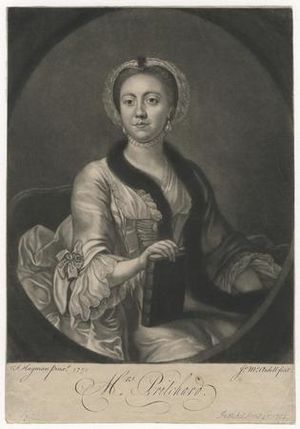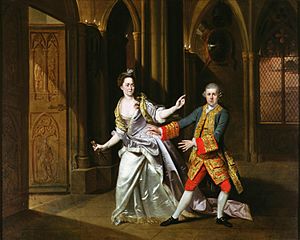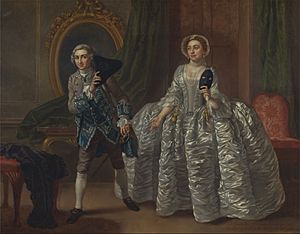Hannah Pritchard facts for kids
Quick facts for kids
Hannah Pritchard
|
|
|---|---|

Pritchard illustrated by James MacArdell, 1762
|
|
| Born |
Hannah Vaughan
1711 |
| Died | 1768 (aged 56–57) |
| Nationality | British |
| Occupation | Actress |
Hannah Pritchard (born Hannah Vaughan, 1711 – 1768) was a famous English actress. She often performed alongside the well-known actor David Garrick. Hannah Pritchard was celebrated for playing many important characters in Shakespeare's plays. She also created new female roles in plays written by authors of her time.
Contents
Life of a Star: Hannah Pritchard's Career
Hannah Vaughan was born in 1711. Early in her life, she married an actor named Pritchard. As Mrs. Pritchard, she began her acting career in 1733. One of her first known performances was at a fair, where she sang a popular song. A writer for the Daily Post newspaper praised her, predicting she would soon move to bigger stages.
This prediction quickly came true. On September 26, 1733, she performed at the Haymarket Theatre in London. She joined a group of actors who had left another famous theatre, Drury Lane. During her first year, she played many different roles. These included Ophelia in Hamlet and Lappet in The Miser. Playing so many different parts early on showed she was a very talented actress.
She soon returned to Drury Lane theatre, where she stayed until 1741. In the summer of 1735, she also performed at the Haymarket. At Drury Lane, she continued to play a wide variety of characters. Many of these were funny, but she also took on serious roles. Some of her notable parts included Lady Wouldbe in Volpone, Lucy Lockit, and Lady Macduff. She also played Anne Boleyn, Desdemona in Othello, and Rosalind in As You Like It.
In 1743, she was the first to play Clarinda in Fielding's play Wedding Day. From 1744 to 1747, she performed at Covent Garden theatre. Here, she added even more important roles to her list. These included Queen Katharine, Lady Macbeth, and Portia in The Merchant of Venice. She also created new characters like Tag in Garrick's Miss in her Teens.
When David Garrick became the manager of Drury Lane in 1747, Mrs. Pritchard joined him. She continued to take on new and challenging roles. In 1749, she played Irene in Samuel Johnson's play Mahomet and Irene. In the first performance, the character Irene was supposed to be strangled on stage. However, the audience reacted strongly, shouting "murder!" Mrs. Pritchard could not finish the scene. The ending of the play was then changed.
She continued to create new roles, showing her versatility. In 1750, she was the first Horatia in Roman Father. In 1753, she played Mrs. Beverley in The Gamester, which many considered one of her greatest performances. She also played Boadicea and Catherine in Garrick's version of The Taming of the Shrew. Other famous roles she played with Garrick included Emilia in Othello and Cleopatra in All for Love.
On October 9, 1756, she played Lady Capulet in Romeo and Juliet. Her daughter, Miss Pritchard, played Juliet, and Garrick played Romeo. Mrs. Pritchard continued to perform new roles in many plays. These included Constantia in Desert Island and Mrs. Oakly in Jealous Wife. Her last new role was Mrs. Mildmay in The Widowed Wife in 1767.
Mrs. Pritchard gave a series of farewell performances in 1767-1768. Her very last performance was on April 24, 1768, when she played Lady Macbeth. She spoke a special speech written by David Garrick for the occasion.
Hannah Pritchard lived a respected life. She had a good amount of money, partly inherited from a relative. She passed away in August 1768 in Bath, not long after she retired. A monument to her memory was placed in Poets' Corner, a special part of Westminster Abbey.
Family Life
Hannah Pritchard had a son who worked as a treasurer at Drury Lane Theatre for a time. Her daughter, Hannah Mary, also became an actress. She made her acting debut as Juliet in Romeo and Juliet on October 9, 1756. People were very excited about her. She was taught by David Garrick and had a very pretty face.
Hannah Mary played many of her mother's roles, like Beatrice and Isabella. However, she never quite reached the same level of fame as her mother. Her biggest successes were in new roles like Harriot in The Jealous Wife. She married an actor named John "Gentleman" Palmer around 1762. She retired from acting in the same year as her mother, 1767-1768. After her husband's death in 1768, she married again.
How People Remember Hannah Pritchard

Many people believed Mrs. Pritchard was one of the brightest stars alongside David Garrick. Some critics, like Richard Cumberland, even thought she was better than other famous actresses of her time. They said she kept getting better as she got older and retired with a good fortune.
She was considered the best Lady Macbeth of her era. Her scene with the ghost in Macbeth was especially admired. Other great roles included the Queen in Hamlet and Doll Common. The writer Leigh Hunt believed she was a true genius, able to play both the most serious and the funniest parts. Charles Churchill also praised her acting. Horace Walpole, who knew and admired her, loved her performances as Maria and Beatrice.
However, some critics had different opinions. Samuel Johnson once said she was good but sometimes seemed a bit "mechanical" in her acting. He also famously said she had probably never read the entire play of Macbeth, only her own lines! While some critics pointed out minor flaws, most agreed that Hannah Pritchard was an incredibly talented and important actress of her time.
Her portraits were painted by famous artists. Francis Hayman painted her twice, including one with Garrick as Clarinda. Johann Zoffany painted her as Lady Macbeth with Garrick. These paintings help us remember her amazing performances.
Sources
- Anthony Vaughan, Born to Please: Hannah Pritchard, Actress, 1711–1768 (London: The Society for Theatre Research, 1979)


